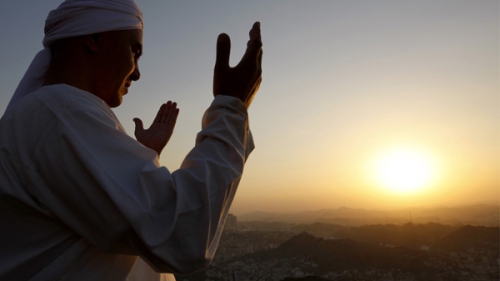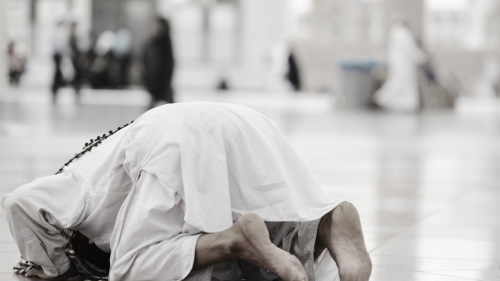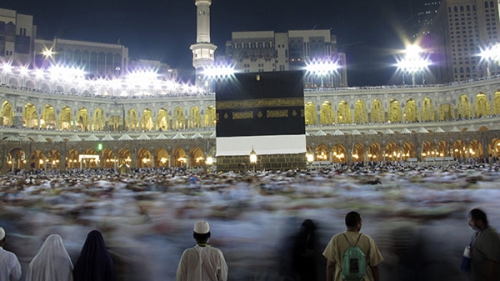30 reasons for redemption

Scholars have often noted that a Muslim should have an almost balanced level of fear and hope in Allah , while their hope in Him should actually be more due to the hadith (narrations) of the Prophet
: "When Allah completed the creation, He wrote in His Book which is with Him on His Throne, 'My Mercy overpowers My Anger.'" (Bukhari)
Yet despite this encouragement from scholars, many Muslims seem to ache from an unhealthy level of guilt and disapproval in themselves, and thus suffer from too little hope in Allah . Subhan Allah, Glory be to God, the shaytan (devil) approaches us through extremes. He comes to some Muslims through the doors of complete negligence in order to prevent them from tawbah (repentance). Yet, he actually comes to others through their humility and tricks them into thinking that feeling excessively guilty all the time for their mistakes and shortcomings is an act of worship. When they accept this approach, it becomes a habit of their nafs (ego). Guilt becomes excessive and a tool against their iman (faith) when it actually prevents a person from real tawbah, because they feel their sins are too heavy, or too oft-repeated, and there is little hope for them to get better. They dread going back to Allah
because they are overwhelmed by shame. They may even ask Allah
for forgiveness but deep down, they feel they are not worthy of it and they begin to doubt themselves in everything they do, and doubt Allah's Love for them, and sometimes give up and indulge even more in sins because of their feeling of hopelessness.
There are a number of mistakes in this approach. First, the word 'tawbah' does not mean excessive guilt nor does it mean despising oneself. Tawbah is translated to mean 'repentance' but comes from the Arabic root which means "to return to." This is the same root as the Beautiful Name of Allah al-Tawwaab. So the one making tawbah is simply returning to Allah while He is Oft-Returning to them in His infinite Mercy.
The second mistake is when the Muslim creates a lot of fiction around their mistakes making them bigger than they actually are, accusing themselves of much worse than what was actually done. They lack having mercy on their own selves in an effort to be sincere, but in doing so actually make it harder for themselves to turn back to Allah as they lose hope. Another form of fiction created around guilt is when the person feels guilty about something which Allah
will not ask them about. It isn't a sin or shortcoming of theirs in the first place, but they feel responsible and guilty. Allah
is Greater than His needing His servants to torture themselves in this way.
The third mistake is even if the sin was something bigger in nature, the guilty person who wants to return to Allah should focus on Allah's Greatness and not the size of their sin. Now this is an interesting point to reflect on. Those whom the shaytan tries to reach through negligence are advised by our predecessors, "Don't think about the sin being minor, think about the Greatness of the One you are sinning against." Similarly, those whom the shaytan tries to hinder through excessive guilt, must also be advised "Do not look at the size of the sin, but the Greatness of the One Who has promised His forgiveness." To think that mistakes are simply too big or too repeated for the forgiveness of Allah
is a form of doubting Allah
infinite Mercy. It is a materialistic approach, subconsciously limiting His Forgiveness to the human constructs of forgiveness we find in the world. The question is not "Will Allah forgive us?" The question is "Will we turn to Him?" The Forgiveness of al-Ghafur, al-Afuww, (the Forgiving, the Pardoner) is greater than anything we can imagine.
The fourth mistake is that Allah doesn't want us to despise ourselves. He wants us to feel regret in disobeying Him, to turn back to Him seeking His forgiveness, to have the determination not to do it again, and if other people were harmed then to return their rights. These are the conditions of tawbah as outlined by Imam Nawawi in Riyadh al-Saliheen. The initial feeling of regret and guilt is simply the key to the whole process. One should not get stuck staring at the key, but use it to unlock the door of seeking forgiveness, and open the door with the determination of not going back, in order to walk into the room of redemption, the room of getting closer to Allah
by returning to Him. It is hope in His Mercy that drives this process and moves a person from simply focusing on the key of regret to actually using it to propel oneself closer to Allah
.
One of the signs that a person carries disapproval of themselves is when they need or seek attention or approval from others in order to feel good. Even acting arrogantly can actually be a sign of personal insecurity rooted in unhealthy guilt. It's amazing to think how a disease that enters through an extreme approach to humility (excessive guilt and despair) actually can lead to its opposite extreme in arrogance. Whatever the guilt is rooted in must be confronted, allowing the person to take their lessons, mend their ways and move forward. When it comes to repenting from harmful addictions, part of one's determination to not return to the sin should include seeking the help of a counselor or therapist. Real tawbah is not about getting stuck in an endless cycle of excessive guilt and returning to sin. Ibn Al-Qayyim mentioned in Jawab al-Kafi a line in which the excessively guilty person describes his diseased state, "I drank a cup to taste its pleasure then drank another to heal its pain."
As Ramadan is the opportune month to purify ourselves from our diseases, I wanted to compile a list of Quranic verses, ahadith, and sayings that remind us how Allah welcomes our returning to Him, our true tawbah. He
is repeatedly assuring us of His Mercy and Forgiveness, not asking us to despise ourselves. Tawbah is about removing the sin from one's path in order to draw even closer to Allah
than before. Every sinful mistake is an opportunity and a signal that it is time to grow in our relationship with Allah
; and as we turn to Him walking, He turns to us rushing. Tawbah as such is an act of redemption and elevation, not despair:
| 1. "Say, 'O My servants who have transgressed against themselves [by sinning], do not despair of the mercy of Allah. Indeed, Allah forgives all sins. Indeed, it is He who is the Forgiving, the Merciful.'" (Qur'an 39:53)
2. "Except those who repent and correct themselves and make evident [what they concealed]. Those - I will accept their repentance, and I am the Accepting of repentance, the Merciful." (Qur'an 2:160) 3. "But whoever repents after his wrongdoing and reforms, indeed, Allah will turn to him in forgiveness. Indeed, Allah is Forgiving and Merciful." (Qur'an 5:39) 4. "[...] Then He turned to them so they could repent. Indeed, Allah is the Accepting of repentance, the Merciful." (Qur'an 9:118) 5. "[O Muhammad], inform My servants that it is I who am the Forgiving, the Merciful." (Qur'an 15:49) 6. "And [there are] others who have acknowledged their sins. They had mixed a righteous deed with another that was bad. Perhaps Allah will turn to them in forgiveness. Indeed, Allah is Forgiving and Merciful." (Qur'an 9:102) 7. "Those who avoid the major sins and immoralities, only [committing] slight ones. Indeed, your Lord is vast in forgiveness. [...]" (Qur'an 53:32) 8. "[...] indeed He is ever, to the often returning [to Him], Forgiving." (Qur'an 17:25) 9. "And whoever does a wrong or wrongs himself but then seeks forgiveness of Allah will find Allah Forgiving and Merciful." (Qur'an 4:110) 10. "[...] And seek forgiveness of Allah. Indeed, Allah is Forgiving and Merciful." (Qur'an 73:20) 11. "[...] Indeed, no one despairs of relief from Allah except the disbelieving people." (Qur'an 12:87) 12. "And when My servants ask you, [O Muhammad], concerning Me - indeed I am near. I respond to the invocation of the supplicant when he calls upon Me. [...]" (Qur'an 2:186) 13. "O you who have believed, repent to Allah with sincere repentance. Perhaps your Lord will remove from you your misdeeds and admit you into gardens beneath which rivers flow [on] the Day when Allah will not disgrace the Prophet and those who believed with him. Their light will proceed before them and on their right; they will say, "Our Lord, perfect for us our light and forgive us. Indeed, You are over all things competent." (Qur'an 66:8) 14. "And those who, when they commit an immorality or wrong themselves [by transgression], remember Allah and seek forgiveness for their sins - and who can forgive sins except Allah? [...]" (Quran 3:135) 15. "[...] Indeed, good deeds do away with misdeeds. That is a reminder for those who remember." (Qur'an 11:114) 16. "Except for those who repent, believe and do righteous work. For them Allah will replace their evil deeds with good. And ever is Allah Forgiving and Merciful." (Qur'an 25:70) 17. "And it is He who accepts repentance from his servants and pardons misdeeds, and He knows what you do." (Qur'an 42:25) 18. On the authority of Anas radi allahu `anhu (may Allah be please with him), who said: I heard the Messenger of Allah 19. On the authority of Abu Hurayrah 20. On the authority of Ibn Abbas 21. Abdullah ibn Omar 22. Anas ibn Malik 23. Narrated Abu Huraira 24. The Prophet 25. He 26. On the authority of Ibn Abbas 27. The Prophet 28. Ali 29. A man asked Abdullah ibn Masood 30. Saeed ibn Musayib |
Subhan Allah, if Allah will forgive you, who are you not to forgive yourself? If He loves you and has mercy on you, who are you not to love yourself and be merciful with yourself? Finally, as is my sunnah in such articles, I also wanted to leave some narrations on a different thought. These are connected in that they show us the general theme that Allah
is much Greater than His needing us to harm and torture ourselves. Actually, He doesn't want those things from us at all. He wants us to elevate ourselves in our relationship with Him. Just as we don't need to beat ourselves up for real tawbah, we also don't need to harm ourselves in order to worship Him best this Ramadan. Let us push ourselves insha Allah, God willing, in a way that keeps us consistent in turning to Him and worshipping Him
.
5 Reasons not to Torture Ourselves!
| 1. Anas ibn Malik 2. Narrated `A'isha 3. Narrated 'Abdullah bin 'Amr: Allah's Messenger 4. Narrated Mujahid from 'Abdullah bin 'Amr: The Prophet 5. The Prophet |
Source: SuhaibWebb - Muslema Purmul
Related Suggestions
Ismail
In French
Je suis totallement d'accord avec ce preche et invite mes freres musulmans a suivre ces conseils.
Wa Salam
Ismail
Masha Allah this is a useful and informative article. Jazak Allah Khairun to Muslema Purmul and Islamicity.
This touches on many of the points discussed in books on developing ones "self esteem" e.g. Psycho-cybernetics by Maxwell Maltz.
"if other people were harmed then to return their rights."
Many individuals especially family members-including non blood relatives brain wash children into believing they have "rights" over them, an unlimited open ended list of rights which may be stated without any basis in Islam. The adults then groom the children into becoming psychologically dependent on them more than in the pleasure of Allah(swt).
This destructive system works because children need the approval of parents which parents can deliberately and inadvertently use to increase their children's dependency resulting in a plethora of problems.
"One of the signs that a person carries disapproval of themselves.. seek attention or approval from others in order to feel good."
Including ones parents. What if parents are continually comparing the child with other persons on any level? E.g.; academic, behavioural, looks, oratory skills, sports etc..what is the result on the children? Resentment, Anger...Endless Discontentment...
I recommend the movie "The Three Idiots" by Amir Khan, Insha Allah children may realise that they must try to avoid choosing careers and directions based on chasing money.
How does Islamic Science help an individual to choose a career suitable for their natural/prominent disposition?
I pray my comments and questions will result in a positive contribution to the need to build contented and peaceful self images which are based on the pleasure of Allah (swt) and not the whims of Shaytan and any of creation.
However as creation we continually need to be respectful to creation.
Peace be upon all mankind.
Michael.
Thank you

















